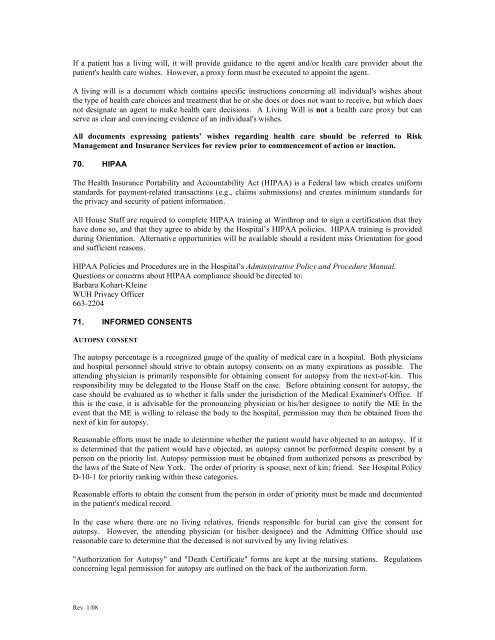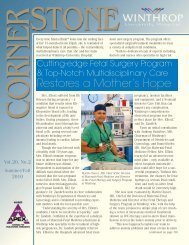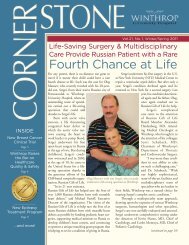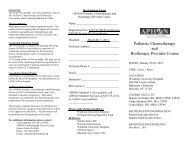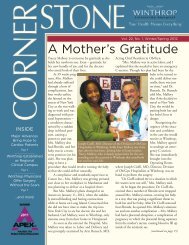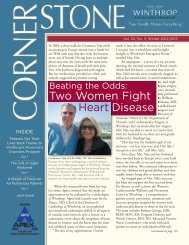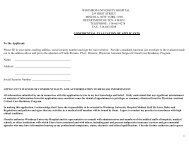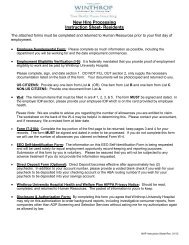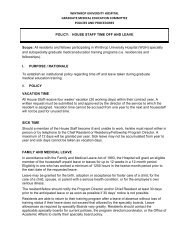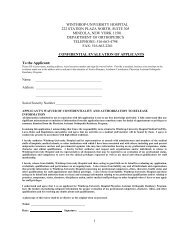House Staff Manual - Winthrop University Hospital
House Staff Manual - Winthrop University Hospital
House Staff Manual - Winthrop University Hospital
Create successful ePaper yourself
Turn your PDF publications into a flip-book with our unique Google optimized e-Paper software.
If a patient has a living will, it will provide guidance to the agent and/or health care provider about thepatient's health care wishes. However, a proxy form must be executed to appoint the agent.A living will is a document which contains specific instructions concerning all individual's wishes aboutthe type of health care choices and treatment that he or she does or does not want to receive, but which doesnot designate an agent to make health care decisions. A Living Will is not a health care proxy but canserve as clear and convincing evidence of an individual's wishes.All documents expressing patients’ wishes regarding health care should be referred to RiskManagement and Insurance Services for review prior to commencement of action or inaction.70. HIPAAThe Health Insurance Portability and Accountability Act (HIPAA) is a Federal law which creates uniformstandards for payment-related transactions (e.g., claims submissions) and creates minimum standards forthe privacy and security of patient information.All <strong>House</strong> <strong>Staff</strong> are required to complete HIPAA training at <strong>Winthrop</strong> and to sign a certification that theyhave done so, and that they agree to abide by the <strong>Hospital</strong>’s HIPAA policies. HIPAA training is providedduring Orientation. Alternative opportunities will be available should a resident miss Orientation for goodand sufficient reasons.HIPAA Policies and Procedures are in the <strong>Hospital</strong>’s Administrative Policy and Procedure <strong>Manual</strong>.Questions or concerns about HIPAA compliance should be directed to:Barbara Kohart-KleineWUH Privacy Officer663-220471. INFORMED CONSENTSAUTOPSY CONSENTThe autopsy percentage is a recognized gauge of the quality of medical care in a hospital. Both physiciansand hospital personnel should strive to obtain autopsy consents on as many expirations as possible. Theattending physician is primarily responsible for obtaining consent for autopsy from the next-of-kin. Thisresponsibility may be delegated to the <strong>House</strong> <strong>Staff</strong> on the case. Before obtaining consent for autopsy, thecase should be evaluated as to whether it falls under the jurisdiction of the Medical Examiner's Office. Ifthis is the case, it is advisable for the pronouncing physician or his/her designee to notify the ME In theevent that the ME is willing to release the body to the hospital, permission may then be obtained from thenext of kin for autopsy.Reasonable efforts must be made to determine whether the patient would have objected to an autopsy. If itis determined that the patient would have objected, an autopsy cannot be performed despite consent by aperson on the priority list. Autopsy permission must be obtained from authorized persons as prescribed bythe laws of the State of New York. The order of priority is spouse; next of kin; friend. See <strong>Hospital</strong> PolicyD-10-1 for priority ranking within these categories.Reasonable efforts to obtain the consent from the person in order of priority must be made and documentedin the patient's medical record.In the case where there are no living relatives, friends responsible for burial can give the consent forautopsy. However, the attending physician (or his/her designee) and the Admitting Office should usereasonable care to determine that the deceased is not survived by any living relatives."Authorization for Autopsy" and "Death Certificate" forms are kept at the nursing stations. Regulationsconcerning legal permission for autopsy are outlined on the back of the authorization form.Rev. 1/08


